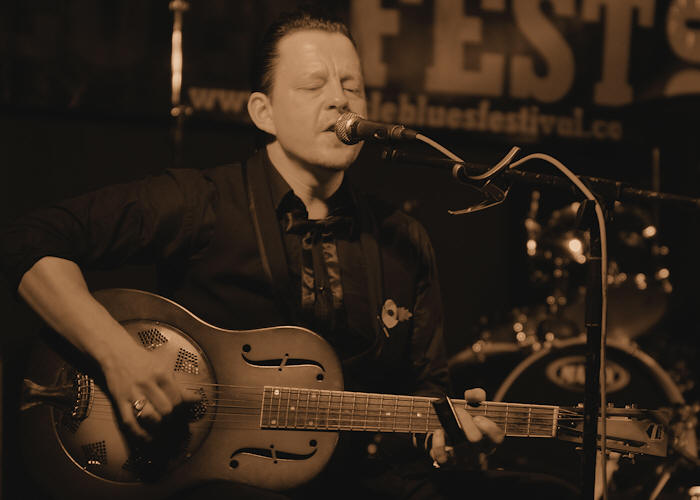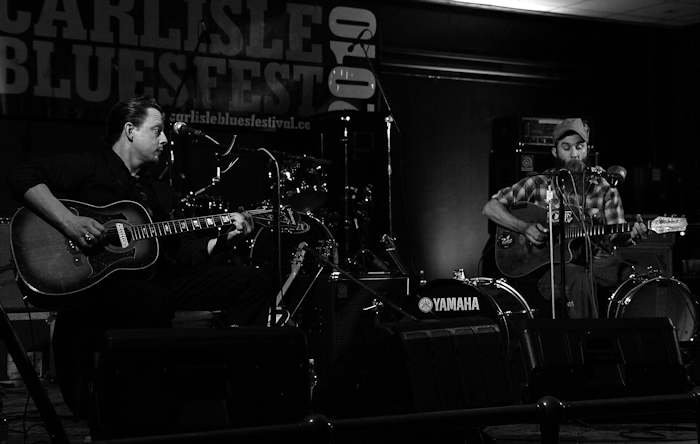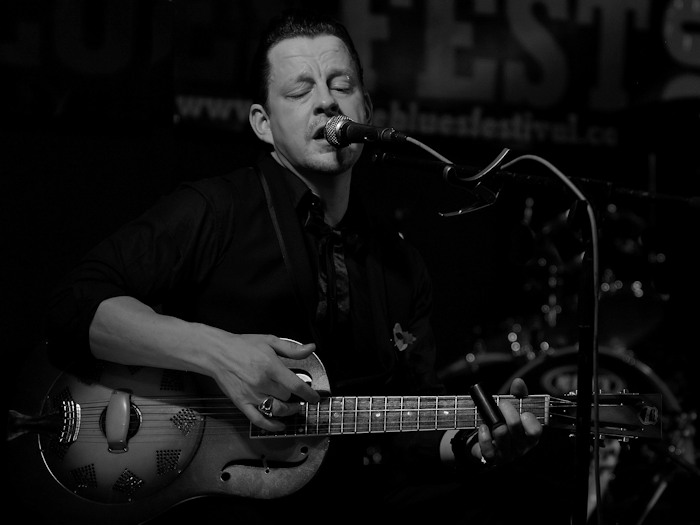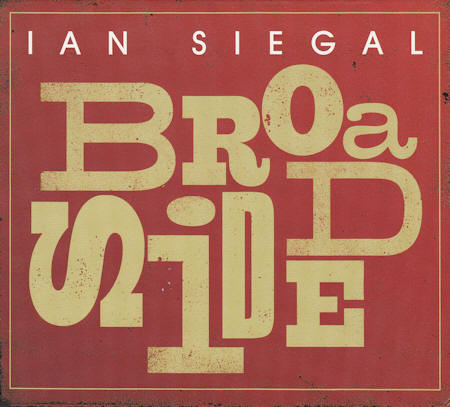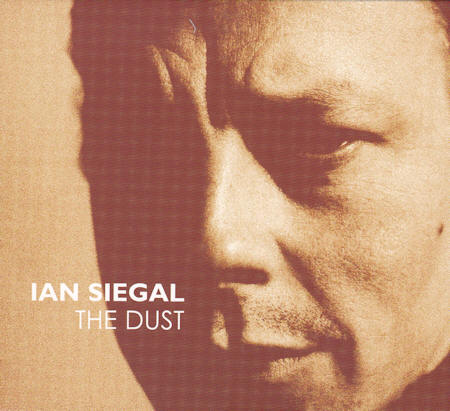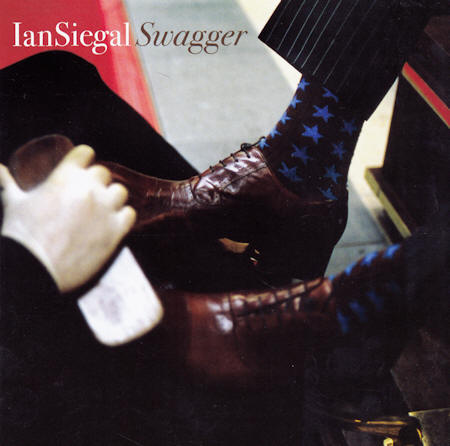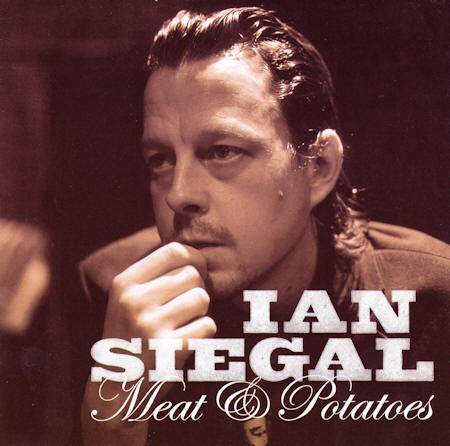
Painting © 2004 Loz
Arkle
Website
© Copyright 2000-2011 Alan White - All
Rights Reserved
Site optimised for Microsoft Internet Explorer
Early Blues Interview
|
|
"Whether fronting his superb band or solo, sitting on a stool with his old resonator, his performances are captivating Ė the hottest property on the European blues scene. In the shadow of the British Blues Scene stalks the lovechild of Howlin' Wolf and Big Mama Thornton" Mojo Magazine "You should be very proud to have this young man in your own country. You have someone right here who can really sing the Deep Blues. He got church in his voice. If my Daddy were alive today he'd say ďThat's my boy!Ē Big Bill Morganfield ďThe closest thing Iíve heard to Chester Burnett.Ē Jeff Beck "I don't have to tell him nothin', he got it.Ē Hubert Sumlin "A natural talent - born to it" Bob Margolin _________________________________________________________________________ I caught up with Ian after his set at the Carlisle Blues Festival during his very successful UK tour with Ben Prestage. Alan: Thanks Ian for sparing me the time. First off, what are your first musical memories?
Alan: Did you come from a musical family? Ian: My cousin is and was an amazing musician, played with Screaming Lord Sutch and is an incredible piano player. Apart from him, not really, just big music fans in my family. My Dad sings now in a choir and he told me only about 5 years or so ago that when he was about 18 he used to sing in a rock and roll band but heíd never told me and Iíve been in music for donkeyís years. It was a local band doing Buddy Holly, Gene Vincent, Eddie Cochrane and all that kind of stuff. Alan: And did you always want to become a musician? Ian: I just drifted into it really. It just kind of happened. Alan: What first attracted you to the blues? Was it the old records of your parents? Ian: Maybe but I got into blues independently from them. I donít really remember not being aware of blues, I donít remember not being aware of Muddy Waters and all those great Chess records. Alan: At the age of 18 you taught yourself to play guitar and went busking in Berlin. What was that like? Ian: It was cold! It was February and it was minus 20 degrees and I learnt to play very very quickly. I was a below average guitar player but because I was living hand to mouth I got reasonable quite fast otherwise I didnít eat. Alan: I understand that youíve toured twice with Big Bill Morganfield. Tell me about that. Ian: It was more than twice but it was okay. I carried him pretty well! Big Billís great, man.
Ian: Yes, Iíve played with him and Mud is alright. Alan: Youíve also played twice with Pinetop Perkins. What was that like? Ian: Again, more than twice. It was amazing. I was an invited guest to play with Pinetop in London and in Edinburgh and then one night all his band joined me on stage at one of my gigs. That was just an honour but my main thing of that experience was to play with Willie 'Big Eyes' Smith on drums, to have a real blues drummer like him playing (no disrespect to any other drummer). Normally I would never ever do songs like Hoochie Coochie Man or Mojo Working but to play these with Willie was a totally different thing. Just amazing. Alan: Of course Muddy and Howlin' Wolf are big influences on you. What makes them stand out for you? Ian: Well, they were just the best. What else can I say? I love Sonny Boy and Elmore James and all those guys but Muddy and Wolf were just...well, thereís a reason they were the two main guys. They were so creative and their lyricism and creativity is second to none. Alan: When did you first meet up with Matt Schofield and Jonny Henderson? Ian: I met Matt about 15 years ago at a jam session in London. Everybody on the London scene, James Hunter, Big Joe Lewis, everybody used to go down there and 18 year old Matt Schofield came down. He was not far off being as good as he is now and just blew everybody away. Alan: You mentioned that you have a new album in the pipeline. Can you tell me any more about that at this stage? Ian: It was recorded in Coldwater, Mississippi at a place called the Zebra Ranch, which used to be the studio of a guy called Jim Dickinson who is a legendary producer and musician from north Mississippi. His sons are the North Mississippi All Stars, Luther and Cody Dickinson, and Cody is now running the studio and he produced the album. We had a bunch of the youngest sons of local legends, Burnside, Kimbroughs, Bobby Bland's son on drums. An incredible experience to work with these people.
Ian: Oh, thatís a horrible question! I guess it depends how you look at it and I could say that itís my life and my living but itís my passion too, not just blues but country and all American roots music is just incredibly important to me and to everybody. Itís a vital expression of the human condition and it continues, it survives. Itís great to see Lucy Zirins, a young English girl getting up and playing resonator guitar and playing the blues. Youíve got young guys, Scott McKeown and all these young kids playing and it proves the importance of blues and how it transcends generations. Alan: Are there any particular songs that have special meaning to you? Ian: Many, many. I played a few tonight actually. Thereís one I played tonight which means a lot to me which is a song by Warren Zevon whoís only really famous for writing a song which he considered a piece of shit, 'Werewolves of London' - that was his big hit, but he wrote a song called Donít Let Us Get Sick which I played this evening. Heís an incredible song writer. Also I didnít play it today but I have been playing on this tour a song by Stephen Collins Foster who was around at the time of the American Civil War and he wrote a lot of songs which became popular in the late 19th and early 20th centuries. Thereís a song of his called 'Hard Times Come Again No More' which Iíve been playing a lot recently and that one resonates with me. Dylan did a version of it, Springsteen did it Ė itís just amazing that this song from a couple of hundred years ago keeps going and still means something. Somebody sang it at Obamaís inauguration and itís incredible that what was at the time just a pop folk song still has such resonance and meaning. Those songs really mean a lot.
Alan: Youíve toured Europe a lot. How healthy do you think the blues scene is in the UK compared to Europe. Ian: You can write ďGrrrrrrrrrĒ for my answer to that. You know this festival, Carlisle, definitely shapes up but generally speaking Iím afraid to say that the UK does not come up to the standard of European blues festivals. Iím not pointing the finger of blame at anybody in particular. I think, and I've said this before, itís lack of sponsorship from local business, government, arts councils, all that kind of stuff. Blues festivals in this country are run by passionate hobbyists, cottage industries and thank God they do it but they donít get the support, whereas in Europe they get all kinds of government funding. Alan: Carlisle is a classic example. Ian: Yes, here at Carlisle Nick does everything, it's incredible what he does, and itís against all the odds but look how successful it is. I wish it could be all like this.
Alan: Youíre currently doing your first solo tour, as a double-header with Ben. Is this type of solo tour going to continue in the future? Ian: Yes, Iíve always played a lot of solo gigs although this is the first major solo tour Iíve done. Yes, for me itís pretty much the same thing Ė whether itís band, solo or whatever, itís about just getting out there and playing good songs for people to listen to. Hopefully that they enjoy. Alan: Is the band continuing? Ian: Yes, absolutely, I believe it is in some form or other. We have future bookings so weíll be out there performing but it might transform into something else or we might add other people. Alan: So, what about Ben Prestage. Where did you first meet? Ian: Last week Ė at the first gig, we hadn't met before. I knew about Ben of course but we met at the gig an hour before we went on. Alan: Thatís amazing because you obviously just gel. Ian: I think thatís because we come from the same school. Ben: Yes, we spent six hours a day rehearsing... Ian: Oh yeah Ė months! Constant emails and mp3's back and forth. No, we obviously come from a similar musical background and we have the same musical influences. He has a very broad range of influences, as a I do, country, blues and all kinds of stuff so the common ground is enormous and itís so easy. Alan: It looks so easy to see you on stage. Ian: Iím dealing with a musician and itís not like dealing with someone who just does their thing and they donít know how to branch out or communicate with other musicians.
Alan: Just a word about Carlisle. This is your 4th appearance at the 4th Carlisle Festival... Ian: I thought it was the 3rd? Alan: No, youíve just done the 4th! People would be disappointed if you're not here next year and I wondered if you had any additional comments about the festival. Ian: Thereís Nick but I know thereís also bunch of people who work their asses off. Itís just a pleasure to be in a situation where people are passionate about music and making it work. Itís how it should be. Actually I donít want to praise them too highly because itís how it should be. Iím passionate about it and they are and itís like, thanks for being as caring about it as I am. Thereís so many of them that donít care, they just donít give a shit. Alan: How do you see the future of blues music? Ian: Well, every few years people talk about a blues boom happening and it doesnít seem to be really happening but I genuinely think that right now there is something. You know with the success of people like my friend Imelda May, even thought itís not strictly blues, itís blues-ish, itís in that genre, itís American rootsy music, and Jim Jones reviewed her very well. And, although Iím not particularly a fan, Seasick Steve is doing good things so it does seem that there is an awareness of it amongst the youth. There is an awareness of what is being thrust before them and what they are accepting and they are getting into. Donít call it blues, just call it cool. Black Keys, you know, all that stuff means that itís probably the healthiest time for good roots music. Alan: Future plans? Ian: Iím going to York tomorrow, thatís about as far ahead as I think. Iíve got a new CD coming out in the Spring [through Nugene Records] and Iím already planning the next one.
Alan: Well, thanks very much Ian, greatly appreciate your time. Filmed in 2007 at the High Barn, Ian Siegal's incomparable rendition of Mary Don't You Weep ....
Ian Siegal albums are available from Nugene Records. Check out photos of Ian Siegal at the Carlisle Blues Festival
Return to
Blues Interviews List |








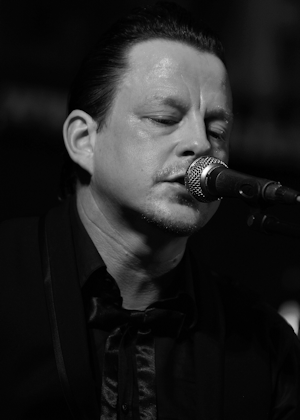 Ian: Listening
to Beatles and Stones but Buddy Holly was the main thing in my house
through my Dad. I guess through that I got into blues, with Chuck Berry
and Little Richard. And at that time bands like Slade and T-Rex were my
things.
Ian: Listening
to Beatles and Stones but Buddy Holly was the main thing in my house
through my Dad. I guess through that I got into blues, with Chuck Berry
and Little Richard. And at that time bands like Slade and T-Rex were my
things. 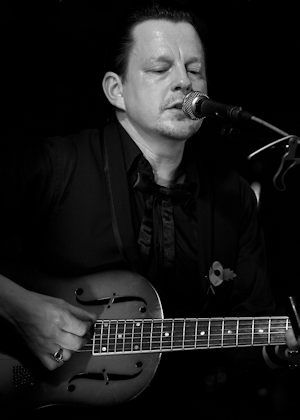 Alan:
We had Mud Morganfield here at Carlisle on Friday. Have you played
with him?
Alan:
We had Mud Morganfield here at Carlisle on Friday. Have you played
with him?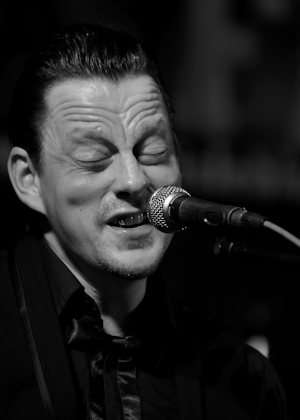 Alan:
So what does the blues mean to you?
Alan:
So what does the blues mean to you?